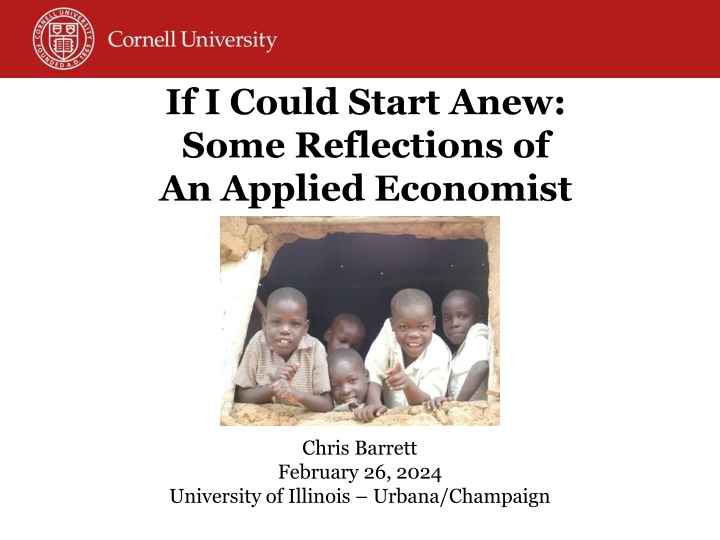
Reflections of an Applied Economist: Impact, Knowledge, and Time Management
Explore the insightful reflections of applied economist Chris Barrett, delving into the motivations behind pursuing this field, the evolving landscape of applied economics, and valuable strategies for intellectual stimulation, impact, and time management in academia. Gain insights on the significance of integrating diverse disciplines, harnessing data science skills, and nurturing the next generation of thinkers.
Download Presentation

Please find below an Image/Link to download the presentation.
The content on the website is provided AS IS for your information and personal use only. It may not be sold, licensed, or shared on other websites without obtaining consent from the author. If you encounter any issues during the download, it is possible that the publisher has removed the file from their server.
You are allowed to download the files provided on this website for personal or commercial use, subject to the condition that they are used lawfully. All files are the property of their respective owners.
The content on the website is provided AS IS for your information and personal use only. It may not be sold, licensed, or shared on other websites without obtaining consent from the author.
E N D
Presentation Transcript
If I Could Start Anew: Some Reflections of An Applied Economist Chris Barrett February 26, 2024 University of Illinois Urbana/Champaign
Aim for Impact Why do we become applied economists? - Fame? Power? Money? Exotic travel? Probably not! Probably more: - intellectual stimulation (i.e., tackle interesting problems) - impact opportunity (i.e., help solve important problems)
Aim for Impact How to enjoy intellectual stimulation and impact? First identify/relax binding constraints: - Knowledge - Access - Time (very rarely is it money!)
Knowledge Applied Economics Today - Heavy emphasis on reduced form empirical work with clean causal identification. Premium on survey and experimental design skills, econometrics - Rapidly increasing data availability / computing power. Rising premium on data science (ML, NLP, GIS) skills. - Growing appreciation of the whole human, drawing on other social sciences to embrace rather than assume away the richness of human behaviors. - Increased recognition of humans inextricability from natural systems (health, ag, etc.) work w/the relevant (soil, climate, crop, fisheries, parasitology, etc.) science.
Knowledge Applied Economics Tomorrow - Most impactful questions integrate description, prediction and inference problems. Need to learn how to do each well. Kleinberg et al. (2015 AER P&P) Likely implies increased - emphasis on structural work and computational methods to get at causal mechanisms. - attention to MSE not just bias. - effort to improve measurement and address non-classical measurement error problems.
Time How to relax time constraints - Develop good time management skills rocks, jar and cup of coffee parable - Make good use of students/pre-docs/post-docs not just as RAs/TAs, but as the next generation who can convey your ideas to the world and improve them! - Our greatest impacts typically come not from our contributions of ideas but from our contributions to the development of others our students, our children. So invest accordingly!
Access - Focus on communicating beyond journal articles at least post-tenure: blogs, columns, policy outreach Focus on clear communication for bright laypeople. - Seek out opportunities to work (e.g., during sabbatical) with firms, NGOs or government agencies you believe in and find out what they feel they need to learn (not what you think they need to learn). Respect those who do (not just scholars). - Accept that most important questions are fundamentally normative and therefore heavily value-laden. Real world decision makers will listen if and only if it s clear that you will learn their language too and that you respect them even if you disagree. Don t be the ugly economist!
If I Could Start Anew I would: 1. Remind myself daily why I chose applied economics 2. Tech up on structural estimation, data science, state-of- the-art measurement methods 3. Develop closer working relationships with students and w/colleagues in sister social and natural sciences 4. Spend more time on clear public communications and with real decision-makers 5. Spend less time trying to impress fellow economists
